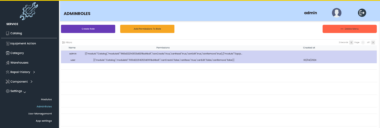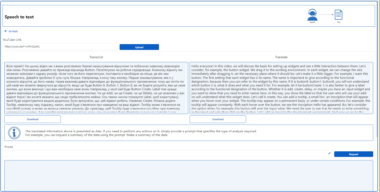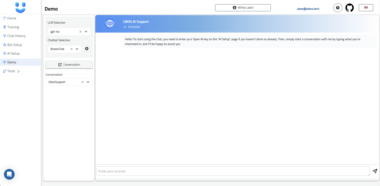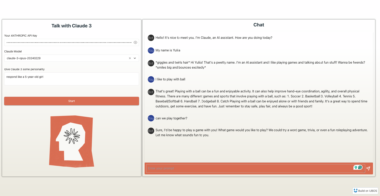MCP Server: Empowering AI Agents with Context-Awareness via UBOS
The MCP (Model Context Protocol) Server represents a significant advancement in the realm of AI Agent development, particularly within the context of Retrieval Augmented Generation (RAG) systems. This innovative server acts as a crucial bridge, enabling AI models, especially Large Language Models (LLMs), to seamlessly access and interact with external data sources and tools. By standardizing how applications provide context to LLMs, the MCP Server unlocks a new level of intelligence and adaptability for AI Agents, making them more effective and versatile in a wide range of applications.
Understanding the MCP Server’s Role
At its core, the MCP Server facilitates the integration of real-world knowledge and data into the decision-making processes of AI Agents. Traditional AI models often operate in a vacuum, relying solely on their pre-trained knowledge. This limitation restricts their ability to handle dynamic situations and access up-to-date information. The MCP Server addresses this challenge by providing a standardized protocol for applications to supply relevant context to LLMs.
Think of it as a universal translator that enables AI Agents to understand and utilize information from diverse sources, regardless of their underlying format or structure. This capability is particularly valuable in scenarios where AI Agents need to:
- Access real-time data (e.g., stock prices, weather forecasts).
- Interact with external APIs (e.g., CRM systems, e-commerce platforms).
- Retrieve information from knowledge bases and databases.
- Reason about complex situations involving multiple data points.
MCP Server in Action: A RAG Implementation with ChromaDB and Docker
This specific implementation of the MCP Server showcases its power within a Retrieval Augmented Generation (RAG) system, leveraging ChromaDB as a vector database and Docker for streamlined deployment. Let’s break down the key components:
- ChromaDB: ChromaDB serves as the vector database, responsible for storing and indexing embeddings of documents. Embeddings are numerical representations of text that capture their semantic meaning, allowing for efficient similarity searches. The RAG system uses ChromaDB to retrieve relevant documents based on the user’s query.
- Python App: The Python application acts as the interface between the user, the LLM, and ChromaDB. It receives user queries, retrieves relevant documents from ChromaDB, combines them with the query, and feeds the combined information to the LLM.
- Docker Compose: Docker Compose simplifies the deployment and management of the RAG system by orchestrating the different services (ChromaDB and the Python app) within containers. This ensures consistency and portability across different environments.
Key Features and Functionalities
This MCP Server implementation offers a range of powerful features:
- Vector Database Integration: Seamlessly integrates with ChromaDB to store and retrieve document embeddings.
- Semantic Similarity Search: Enables efficient retrieval of relevant documents based on the semantic similarity between the user’s query and the document embeddings.
- Dynamic Configuration: Allows for easy configuration through environment variables, making it adaptable to different environments and use cases.
- Dockerized Deployment: Simplifies deployment and management with Docker Compose.
- Customizable: Provides a foundation for building custom RAG systems by allowing users to add their own documents and queries.
- Collection Management: Facilitates the creation and management of vector collections within ChromaDB.
Use Cases: Unleashing the Potential of Context-Aware AI Agents
The MCP Server opens up a wide array of use cases across various industries. Here are a few examples:
- Customer Service: AI Agents can access customer data from CRM systems to provide personalized and informed support.
- Financial Analysis: AI Agents can analyze market data and news articles to provide investment recommendations.
- Healthcare: AI Agents can access patient records and medical literature to assist doctors in diagnosis and treatment.
- Legal Research: AI Agents can analyze legal documents and precedents to assist lawyers in legal research.
- Knowledge Management: AI Agents can access internal knowledge bases to answer employee questions and provide information.
Integration with the UBOS Platform: A Synergistic Approach
The MCP Server seamlessly integrates with the UBOS platform, creating a powerful ecosystem for AI Agent development and deployment. UBOS is a full-stack AI Agent development platform designed to bring AI Agents to every business department. By combining the MCP Server with the capabilities of UBOS, businesses can:
- Orchestrate AI Agents: UBOS provides a centralized platform for managing and orchestrating AI Agents, ensuring they work together effectively.
- Connect to Enterprise Data: UBOS simplifies the process of connecting AI Agents to enterprise data sources, regardless of their location or format.
- Build Custom AI Agents: UBOS allows businesses to build custom AI Agents tailored to their specific needs, using their own LLM models and data.
- Deploy Multi-Agent Systems: UBOS facilitates the deployment of multi-agent systems, where multiple AI Agents collaborate to solve complex problems.
The UBOS platform complements the MCP Server by providing a comprehensive environment for building, deploying, and managing AI Agents. The MCP Server focuses on enabling context-awareness, while UBOS focuses on providing the infrastructure and tools needed to build and deploy AI Agents at scale.
Benefits of Using UBOS with MCP Server
- Streamlined Development: UBOS provides a low-code/no-code environment for building AI Agents, reducing the development time and complexity.
- Enhanced Collaboration: UBOS facilitates collaboration between developers, data scientists, and business users, ensuring that AI Agents are aligned with business goals.
- Improved Scalability: UBOS is designed to scale to meet the demands of enterprise applications, ensuring that AI Agents can handle large volumes of data and traffic.
- Simplified Deployment: UBOS simplifies the deployment of AI Agents, allowing businesses to quickly deploy and test new AI Agents.
- Centralized Management: UBOS provides a centralized platform for managing AI Agents, making it easy to monitor performance, track usage, and update AI Agents.
Getting Started with the MCP Server
To get started with this specific implementation of the MCP Server, follow these steps:
Prerequisites: Ensure you have Docker and Docker Compose installed on your system.
Clone the Repository: Clone the repository from GitHub using the following command:
bash git clone https://github.com/krimoi45/chroma-docker-rag.git cd chroma-docker-rag
Start the Services: Start the services using Docker Compose:
bash docker-compose up --build
Customization: Tailoring the MCP Server to Your Needs
The MCP Server is designed to be highly customizable, allowing you to tailor it to your specific needs. You can:
- Add your own documents: Add your own documents to the ChromaDB database to improve the accuracy and relevance of the RAG system.
- Modify the Python script: Modify the
main.pyscript to customize the query processing logic and the interaction with the LLM. - Integrate with other data sources: Integrate the MCP Server with other data sources to provide AI Agents with access to a wider range of information.
- Use different LLMs: Experiment with different LLMs to find the one that best suits your needs.
Conclusion: The Future of Context-Aware AI Agents
The MCP Server represents a significant step forward in the development of context-aware AI Agents. By providing a standardized protocol for applications to supply context to LLMs, the MCP Server unlocks a new level of intelligence and adaptability for AI Agents. Combined with the power of the UBOS platform, businesses can leverage the MCP Server to build and deploy AI Agents that are more effective, versatile, and capable of solving complex problems. As AI technology continues to evolve, the MCP Server will play an increasingly important role in enabling the next generation of AI-powered applications.
By embracing the MCP Server and integrating it with platforms like UBOS, organizations can unlock the full potential of AI Agents and drive innovation across their operations. The future of AI is context-aware, and the MCP Server is a key enabler of that future.
Chroma Docker RAG
Project Details
- krimoi45/chroma-docker-rag
- Last Updated: 4/15/2025
Recomended MCP Servers


Markdown To PDF Conversion MCP

A Python-based Model Context Protocol (MCP) tool for Kubernetes clusters that exposes a comprehensive API to retrieve cluster...
MCP server that provides computer control capabilities, like mouse, keyboard, OCR, etc. using PyAutoGUI, RapidOCR, ONNXRuntime. Similar to...

基于Python的MCP网关
Hedera MCP server
An MCP (Model Context Protocol) tool that provides stock market data and trading capabilities using the yfinance library,...
MCP server for Dart VM and Flutter


A Model Context Protocol server for Zendesk
 From vibe coding to vibe deployment. UBOS MCP turns ideas into infra with one message.
From vibe coding to vibe deployment. UBOS MCP turns ideas into infra with one message.





